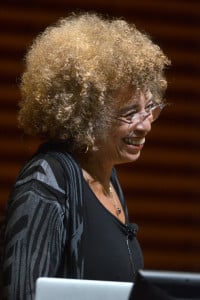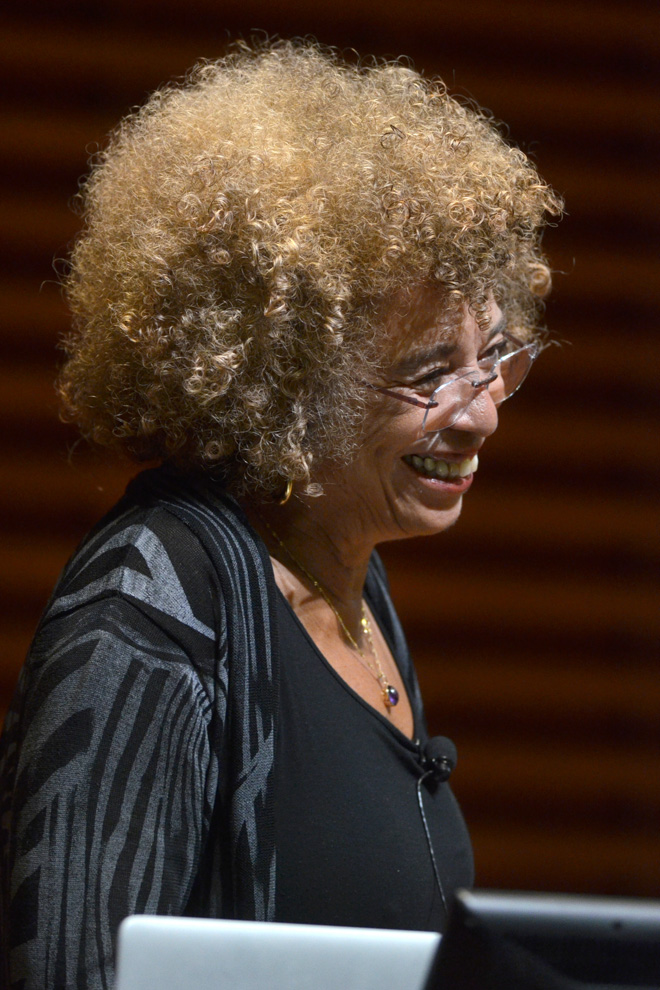
Angela Davis, the noted civil and political rights activist, spoke Wednesday night as a part of the Race, Policing, and Mass Incarceration lecture series. The lecture was co-sponsored by African & African American Studies, the Institute for Diversity and the Arts and the Clayman Institute.
Davis began her lecture by listing names of innocent black men and women who have been killed by police in the past few years.
“How many of you recognized all of the names?” Davis asked of the audience. Only a smattering of the more than five hundred audience members raised their hands.
“There is a logic to these killings,” Davis explained. “A logic that stretches back to the era of slave masters and slave drivers and slave patrols.”
The movement to raise awareness of these senseless killings, Black Lives Matter, has been active on Stanford’s campus over the past year.
“So what does it mean to say that ‘black lives matter’? Some people say that that is an exclusive phrase. But to say ‘black lives matter’ does not mean that we are also saying that all other lives do not matter,” Davis said. This movement, she believes, is a way to raise the voices of all marginalized groups across America.
Davis commended Stanford students’ efforts to make this moment in history a time for change.
“You’re really fortunate to be alive at this moment. This is a special moment. As someone who has been around for a long time and seen many decades of change, this is the most excited that I have been in a long, long time.”
One of Davis’s main points during the lecture was her support of the idea of prison abolition rather than prison reform. Davis believes the police and prison system in America is too deeply flawed at its core to be able to reform it. Instead, it should be removed completely. While this idea seems radical, Davis contends that those who argued for the abolition of slavery many eras ago were seen as “absolutely insane” at the time.
“Abolition requires us not only to think about the institutions that are connected with prisons but it makes us think about how to transform a society that relies on police and relies on prisons,” Davis argued.
Davis’s ideas about prison abolition are centered on the need for strengthening other institutions through programs such as free education, adequate health care and access to jobs. Work on these problems, she says, and our prison system is virtually unnecessary.
“How can we solve these problems? With better police? Better prisons? What about re-imagining security? What about abolishing policing and imprisonment as we know it? I want us to think about the possibility of demanding what we really want, not what we think will be offered to us,” Davis lectured.
Davis also talked about the linkage between several other injustices with the problem of mass incarceration and the process of criminalization. Domestic violence and human rights violations around the world are also inherently linked to problems with police violence, Davis argued. She cited the specific example of George Zimmerman recently being charged with accounts of domestic violence as merely one example of the link.
“Revealing these reservoirs of violence and challenging them will help to diminish the overall economy of violence,” Davis said.
The other linkage of police brutality to global problems is the connection to the Israeli-Palestinian conflict.
Davis quoted Dr. Martin Luther King, saying, “Justice is always indivisible.”
She went on to explain, “We can’t call for an end to racist violence without realizing the connections that allow us to recognize that the militarization of the police here is linked to the effort to defend the violent occupation of Palestine.”
Those in the audience who might have been skeptical of the connection were quickly addressed.
“Those of you who might argue that Israel has nothing to do with racist police departments: look at the record. Many of the police departments have received training by the state of Israel. The Oakland police were trained in Israel. The St. Louis police were trained in Israel. Often times what appears to be totally disconnected is actually linked in an intimate relationship,” Davis said.
Davis mentioned the fact that Stanford students have seen this connection and applauded the fact that many students involved in the Black Lives Matter campaign are also deeply involved in the Stanford Out of Occupied Palestine organization.
Davis advised students, “You can’t always tell that your work will achieve your goal but you do know one thing: if you do nothing, things will get worse.”
Michelle McGhee ’18, a student in the Race, Policing, and Mass Incarceration course, enjoyed hearing from Davis, such an iconic figure in the black freedom movement, in person.
“I actually expected her to be more radical. I like when people present really radical ideas and make you question your beliefs,” McGee said.
As for Davis’s idea of prison abolition, McGee wants to learn more.
“I kind of agree with her premise that the systems are [so] inherently messed up that reform may not be possible. The more I learn about this topic the more I can agree with her. But it is sort of a daunting task. ”
Contact Elizabeth Wallace at wallacee ‘at’ stanford.edu
